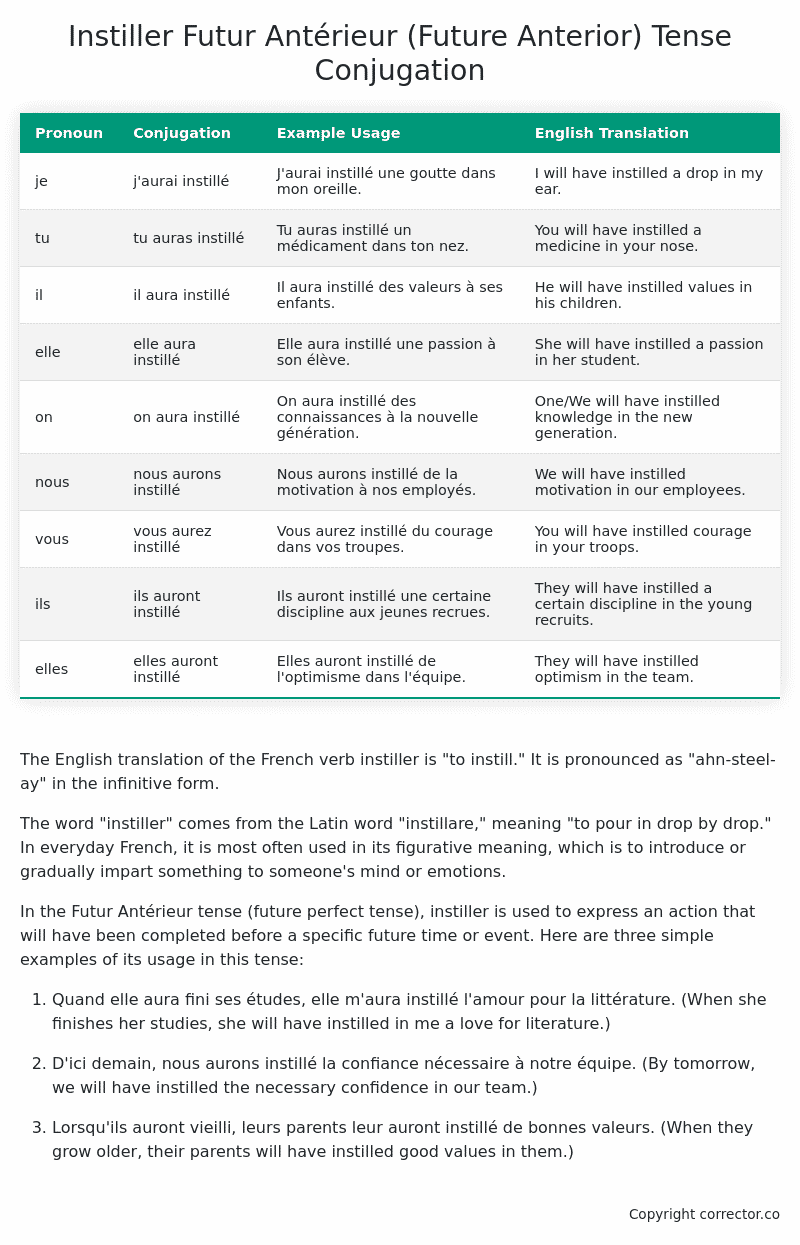Futur Antérieur (Future Anterior) Tense Conjugation of the French Verb instiller
Introduction to the verb instiller
The English translation of the French verb instiller is “to instill.” It is pronounced as “ahn-steel-ay” in the infinitive form.
The word “instiller” comes from the Latin word “instillare,” meaning “to pour in drop by drop.” In everyday French, it is most often used in its figurative meaning, which is to introduce or gradually impart something to someone’s mind or emotions.
In the Futur Antérieur tense (future perfect tense), instiller is used to express an action that will have been completed before a specific future time or event. Here are three simple examples of its usage in this tense:
-
Quand elle aura fini ses études, elle m’aura instillé l’amour pour la littérature.
(When she finishes her studies, she will have instilled in me a love for literature.) -
D’ici demain, nous aurons instillé la confiance nécessaire à notre équipe.
(By tomorrow, we will have instilled the necessary confidence in our team.) -
Lorsqu’ils auront vieilli, leurs parents leur auront instillé de bonnes valeurs.
(When they grow older, their parents will have instilled good values in them.)
Table of the Futur Antérieur (Future Anterior) Tense Conjugation of instiller
| Pronoun | Conjugation | Example Usage | English Translation |
|---|---|---|---|
| je | j’aurai instillé | J’aurai instillé une goutte dans mon oreille. | I will have instilled a drop in my ear. |
| tu | tu auras instillé | Tu auras instillé un médicament dans ton nez. | You will have instilled a medicine in your nose. |
| il | il aura instillé | Il aura instillé des valeurs à ses enfants. | He will have instilled values in his children. |
| elle | elle aura instillé | Elle aura instillé une passion à son élève. | She will have instilled a passion in her student. |
| on | on aura instillé | On aura instillé des connaissances à la nouvelle génération. | One/We will have instilled knowledge in the new generation. |
| nous | nous aurons instillé | Nous aurons instillé de la motivation à nos employés. | We will have instilled motivation in our employees. |
| vous | vous aurez instillé | Vous aurez instillé du courage dans vos troupes. | You will have instilled courage in your troops. |
| ils | ils auront instillé | Ils auront instillé une certaine discipline aux jeunes recrues. | They will have instilled a certain discipline in the young recruits. |
| elles | elles auront instillé | Elles auront instillé de l’optimisme dans l’équipe. | They will have instilled optimism in the team. |
Other Conjugations for Instiller.
Le Present (Present Tense) Conjugation of the French Verb instiller
Imparfait (Imperfect) Tense Conjugation of the French Verb instiller
Passé Simple (Simple Past) Tense Conjugation of the French Verb instiller
Passé Composé (Present Perfect) Tense Conjugation of the French Verb instiller
Futur Simple (Simple Future) Tense Conjugation of the French Verb instiller
Futur Proche (Near Future) Tense Conjugation of the French Verb instiller
Plus-que-parfait (Pluperfect) Tense Conjugation of the French Verb instiller
Passé Antérieur (Past Anterior) Tense Conjugation of the French Verb instiller
Futur Antérieur (Future Anterior) Tense Conjugation of the French Verb instiller (this article)
Subjonctif Présent (Subjunctive Present) Tense Conjugation of the French Verb instiller
Subjonctif Passé (Subjunctive Past) Tense Conjugation of the French Verb instiller
Subjonctif Imparfait (Subjunctive Imperfect) Tense Conjugation of the French Verb instiller
Subjonctif Plus-que-parfait (Subjunctive Pluperfect) Tense Conjugation of the French Verb instiller
Conditionnel Présent (Conditional Present) Tense Conjugation of the French Verb instiller
Conditionnel Passé (Conditional Past) Tense Conjugation of the French Verb instiller
L’impératif Présent (Imperative Present) Tense Conjugation of the French Verb instiller
L’infinitif Présent (Infinitive Present) Tense Conjugation of the French Verb instiller
Struggling with French verbs or the language in general? Why not use our free French Grammar Checker – no registration required!
Get a FREE Download Study Sheet of this Conjugation 🔥
Simply right click the image below, click “save image” and get your free reference for the instiller Futur Antérieur tense conjugation!

Instiller – About the French Futur Antérieur (Future Anterior) Tense
Construction
Common Everyday Usage Patterns
Interactions with Other Tenses
For example
Summary
I hope you enjoyed this article on the verb instiller. Still in a learning mood? Check out another TOTALLY random French verb conjugation!


